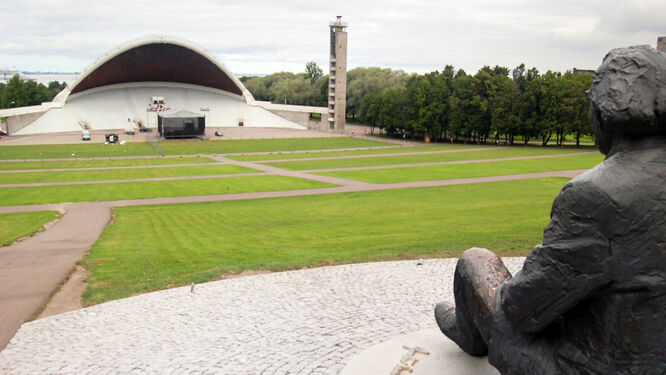Estonia’s Song of Freedom
By Rick Steves
It’s amazing what a stretch of water can do. The Baltic Sea separates Estonia from Sweden and Finland. The struggles of the last couple of generations couldn’t be more different on these opposite shores. When I visited the Baltic states back in the 1980s, labor was cheaper than light bulbs. While I was touring museums, an old babushka would actually walk through the museum with me, turning the lights on and off as we went from room to room.
Those days are long gone. Estonia’s busy capital, Tallinn, is like a petri dish of capitalism. Since winning its freedom in 1991, the country has blossomed.
On this visit, my guide, Mati, brags that Estonia has the strongest economy, most freedom, and highest standard of living of any republic that was part of the USSR. He says that by some measures, Estonians are now one of the freest people on Earth.
Mati points out the great irony of Russia’s communist experiment. Russia, once the supposed champion of radical equality—as far as Leninism and Marxism were concerned—is now infamous for having the worst inequality. In the dirty derby of unequal wealth distribution, Russia manages to beat the US. Estonians are better off today than Russians not because they have more money per capita (they don’t), but because the wealth in this country is distributed much more evenly. Mati, who’s spent half his life under communism and half under capitalism, says, “Politics. It’s all about the distribution of wealth.”
Mati drives us back into Tallinn to explore its Old Town. Strolling the street in need of a coffee break, we step into a courtyard. At the entry the landlord has hung a photo of the place back in 2000. It looked like a war had hit it. Today, while it looks much the same, it’s inhabited by thriving businesses.
Over coffee, I ask Mati more about life in the USSR. With Finland within distance of rabbit-ear antennas, Estonians were the only people in the USSR who got Western TV during the Cold War. Mati remembers when the soft-core porn flick Emmanuelle aired. No one here had seen anything remotely like it. With that single broadcast, there was a historic migration of Estonians from the south of the country to Tallinn, where they could receive Finnish TV. He said, “Nine months later, we Estonians experienced a spike in births.”
In Mati’s youth, the entire USSR—one-sixth of the world—was theoretically open to him, but he had no way to get a plane ticket or a hotel room, so in practice travel was not possible. The other five-sixths of the planet was simply off-limits. In the 1950s and 1960s, the USSR ordered all Estonian recreational boats destroyed because they were considered potential “escape vehicles.” It was an era in which Estonia was virtually a prison.
In the early 1990s, after the fall of the USSR, a kind of Wild West capitalism swept the country. The country’s first millionaire was a clever entrepreneur who dismantled the physical trappings of Soviet control and sold it as scrap metal. Mati and five friends made good money by importing classic American cars and selling them to rich Russians. But one day, four of Mati’s friends went to Russia to collect payment on a car and were killed—riddled with machine-gun bullets. Mati decided to drop his car business and become a tour guide.
Mati says, “The Russian mob makes Sicily’s mob look like a church choir. Putin directed the KGB back then. If you think Putin doesn’t understand how to hold on to power, forgive me, but you are a fool or you are blind.”
Mati and I visit Tallinn’s huge Song Festival Grounds, which look like an oversized Hollywood Bowl. Overlooking the grassy expanse, with the huge stage tiny in the distance, Mati explains that in 1988, when Estonia was breaking away from the USSR, over 300,000 people—a third of the country—gathered here to sing patriotic songs.
“Stuck between Russia and Germany, we were almost invisible,” Mati says. “Our national songfest was a political statement. We are so few in number that we must emphasize that we exist. We had no weapons. All we could do was be together and sing. This was our power.”
Their Singing Revolution, peaceful and nonviolent, persisted for several years, and in the end, Estonians gained their freedom in 1991. The Song Festival Grounds, still used for concerts today, is a national monument for the compelling role it played in this small country’s fight for independence. Traveling with Mati through Estonia, I’m reminded that I simply inherited freedom. For many, freedom has to be earned.
This article was adapted from Rick’s new book, For the Love of Europe.

